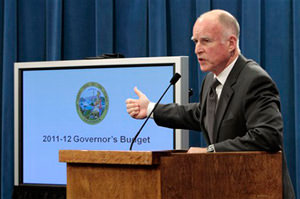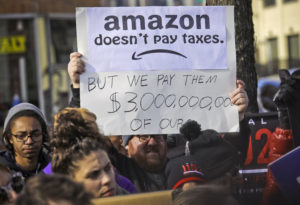The Story of a Lifetime
Covering the statehouse or city hall is regarded as the minor leagues of political journalism. But this year, these too-often-unappreciated scriveners are in the middle of one of the most important domestic stories in decades.Get their names, titles and e-mail addresses. Hold them accountable. Expose those causing so much pain. Don’t listen to their spin.
Covering the statehouse or city hall is regarded as the minor leagues of political journalism. A substantial number of those so employed would rather be in Washington, on the campaign plane or in an editor’s chair tyrannizing reporters. But this year, these too-often-unappreciated scriveners are in the middle of one of the most important domestic stories in decades.
On their beats—now only a few after years of media cutbacks—they’re witnessing how the recession has driven states and local governments into financial calamity, taking an enormous toll on services for the poor, police and fire protection, snow removal and many other unglamorous necessities.
Selling such stories to editors is tough. Editors, under pressure to cover celebrities and scandal, find them boring. When I was a local-government reporter, I had to use a lot of imagination and salesmanship to interest my editors. City hall reporters tell me it’s worse today.
But recent events could force a massive reappraisal of such attitudes.
Just take a look at the speeches that Democratic Govs. Jerry Brown of California and Andrew Cuomo of New York gave when they took office on the first week of the new year.
Cuomo, The New York Times reported, proposed freezing the salaries of most state employees, reducing spending for Medicaid (the program for the poor) and limiting property tax increases. “What made New York the Empire State was not a large government complex,” he said. “It was a vibrant private sector that was creating great jobs in the state of New York.”
Brown, who served two terms as governor (1975 to 1983) in more prosperous times, said, “The budget I present … will be painful, but it will be an honest budget. The items of spending will be matched with available tax revenues. …”
California faces a $28 billion budget deficit. New York’s is almost $10 billion.
For the revenue shortage, you can blame the recession, the tea party-mad Republicans in Congress and President Barack Obama’s sharp tack to the center and away from the liberal government activism that produced the 2009 stimulus bill.
The Center on Budget and Policy Priorities reported that the census has found that state tax revenues declined by $67 billion in 2008-09. It was, the center said, “a collapse of unprecedented magnitude.” And with revenue falling, high unemployment and loss of health insurance benefits increased the number of those eligible for Medicaid (partly financed by the states) and other services.
It would have been much worse without the stimulus bill, so reviled by the Republicans and business interests. You wouldn’t know it from their tirades, but the stimulus was a lifesaver for many. Even so, it would be foolish to expect another one in light of the Republicans’ new congressional power and pro-business William M. Daley newly installed as Obama’s chief of staff.
Just how important the Daley appointment was to business was illustrated by the positive reaction of the U.S. Chamber of Commerce, the nation’s biggest business lobby organization. The group had opposed Obama’s health care and financial regulatory bills and provided $75 million for political ads in the midterm congressional elections, mainly directed against Democrats. “This is a strong appointment,” Thomas Donohue, the organization’s president, said in a statement. “We look forward to working with him to accelerate our recovery, grow the economy, create jobs, and tackle America’s global challenges.”
So let Donohue hoist a celebratory drink with his new friends in the White House while the stimulus program dies and, as the budget priorities center predicted, “states face budget gaps in 2012 that will make 2009 look almost rosy by comparison.”
Making things worse, Cuomo, Brown and other governors oppose higher taxes, although Brown said he would put tax increases to a popular vote later this year.
For the journalists covering statehouses and city halls, this offers either the opportunity or missed opportunity of a lifetime.
The opportunity would be to report the cause and the impact of a calamity. We journalists love such things, although we do better if they are a hurricane, fire or riot. In this case, journalists will have to dig from neighborhoods to city hall, from the statehouse to Washington, and nail those making the decisions. Get their names, titles and e-mail addresses. Hold them accountable. Expose those causing so much pain. Don’t listen to their spin.
Great journalism of this kind could show the harm done by the anti-government campaign so effectively mounted by business and the Republicans in last year’s election. As Katrina vanden Heuvel, editor and publisher of The Nation, wrote, “The consequences of inhumane cuts in state and city budgets—ravaged pensions, gutted schools, mass unemployment—could lead people of all parties to a renewed understanding and appreciation of government’s role.”
I’d like to believe that. But too many television and radio stations have slashed their government and political reporting staffs. The American Journalism Review found that the number of reporters covering statehouses around the country dropped from 524 in 2003 to 355 in 2009. Too many of the reporters are now out of the business.
We may be approaching one of America’s great unreported disasters—both for the country and for journalism.
Your support matters…Independent journalism is under threat and overshadowed by heavily funded mainstream media.
You can help level the playing field. Become a member.
Your tax-deductible contribution keeps us digging beneath the headlines to give you thought-provoking, investigative reporting and analysis that unearths what's really happening- without compromise.
Give today to support our courageous, independent journalists.




You need to be a supporter to comment.
There are currently no responses to this article.
Be the first to respond.